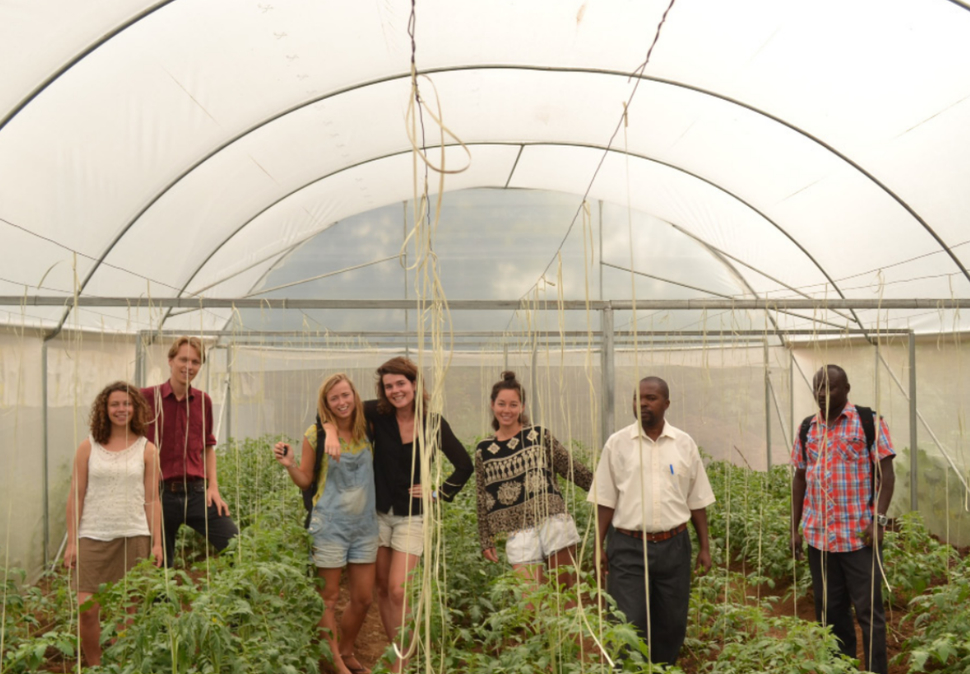Improving the course
The February 2016 course will be given as a pilot and there won’t be a fee for the farmers. The next group from the TU Delft should evaluate the feedback from the participants and teachers to improve the course. We recommend they should also visit the farmers that participated in the course and check if their greenhouses are still running and if they faced any problems that they didn’t learn about in the course. Furthermore, we recommend starting a new course as soon as possible after their arrival in Bondo. In this way they will be able to implement the changes they made to the course immediately and also be able to get direct feedback. Also a booklet needs to be made to hand out to the farmers after completing the course.
Market Research
The idea of rentable greenhouses comes direct from the minor group ‘Pamoja Greenhouses’ who developed this plan in Nairobi. The research to this idea in Bondo is not yet finished and to turn this foundation into a success, a small market research is necessary.
• How much is a farmer able to pay for a greenhouse?
• Are farmers interested in a 5 year commitment?
• The profits used in the business model are based on books, but is a greenhouse
profitable in practice?
Completing the Board
At the moment Mr. Achuti and Dr. Andika agreed on joining the board. But there are some very important members missing, in particular the person that will be in charge of the financial department. We are considering someone from a local finance institute or NGO, but we haven’t had enough time to think it through yet. That’s why we suggest that the next group will investigate all the possible options. By this way we can make sure the best possible formation of the board of the BIG Foundation will be established.
Fundraising
The BIG foundation is unable to cover the full costs of the leasing program. Additional funding will be needed to afford the greenhouses. Students 4 Sustainability and the Ministry of Agriculture Sub County Bondo might be interested in joining the project. Furthermore, a local microfinance institute might be interested. Mr. Achuti is familiar with this organisation. They will need to be contacted and a contract needs to be signed as soon as possible.
Meeting with the Vice Chancelor
On January 19th a meeting was held with the Vice Chancellor and Dr. Ndegwah to discuss the long-term plan and ask for approval. Several changes had to be made to the plan described above:
The role of the foundation:
To avoid an illegal conflict of interest, Dr. Andika and Mr. Achuti cannot join the board. Instead the BIG foundation will be registered by the TU Delft students, before July 2016. The board will consist out of TU Delft students, a person in charge of the financial department and a local farmer. The tasks of the foundation will be reduced to leasing the greenhouses only.
The role of the University:
The University will take over the task of the foundation that involves giving the course. They will arrange the instructors, classrooms and payments. It is also the responsibility of JOOUST to maintain the greenhouses and use them for research, teaching and rental purposes. To make sure those conditions are met, a committee will be set up, whereby Dr. Andika will be the chairman. Besides him, Dr. Ndegwah, Alice, Mr. Achuti, someone from the finance department, someone from the kitchen and a student will join.
The role of the Ministry of Agriculture:
Leasing the greenhouses will be done with assistance of the Ministry of Agriculture, hereby bringing Mr. Achuti back in the picture.
Follow-up Tasks
The follow up will exist out of the AIESEC group and a new group of students of the minor International Entrepreneurship & Development. For these groups we have briefed their tasks.
Summer 2016 (AIESEC students)
In winter 2016, the BIG foundation will be registered, but the execution has not yet
started. This will be the main goal for the AIESEC students. The following tasks need to
be fulfilled:
1. Assign a local person to be in charge of the financial department of the foundation.
2. Market research on greenhouse leasing.
3. Revise the business plan based on the market research and develop an organisation
plan.
4. Find a reliable business or technician who will build a water harvesting system with
the greenhouses.
5. Search for a reliable greenhouse manufacturer, with suitable greenhouses for this
region.
6. Fundraising.
November 2016 (TU Delft students)
We recommend sending at least 5 students to continue this project.
1. Where needed, improve the content of the course.
2. Start a second course, with the adjusted course material.
3. Develop a booklet of the course for the farmers.
4. Construct a greenhouse, according to the agreement made between S4S and
JOOUST. The construction takes approximately one week. It is recommended to add
more water tanks if there is enough budget.
5. Manage the BIG foundation from where the AIESEC students left off. The plan made
by the AIESEC students can be executed. Use the funds to construct a first greenhouse
on a farmers’ property to be used as a pilot for the leasing program.
Please contact us for the entire long term plan.
